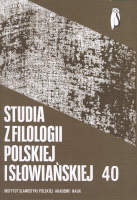Kulturoznawcze studia regionalne nad Słowiańszczyzną Południową - stan aktualny
Regional culture studies of the Southern Slavic areas
Author(s): Krzysztof WrocławskiSubject(s): Language studies
Published by: Instytut Slawistyki Polskiej Akademii Nauk
Summary/Abstract: This work focuses on a very contemporary need of regional studies of the Southerns Slavic countries. It provides two definitions of this region: a macroregion consisting of several national cultures, as well as separate regions representing a part of a broader nation with a very specific culture. Entire Yugoslavia, before and after the war, until its dissolution in the 990’s fits perfectly into the first definition of a macroregion with a status of the country. Second meaning, that of a cultural region as a part of a nation or country, matches the multicultural character of the entire Southern Slavic territory. The political principle of the ideals of brotherhood and unity, which was the basis of Tito’s Jugoslavia, has made it possible to partially recreate regional territorial separation. In this country, there was a structure of republics and autonomical circuits which was based on either nationalities or ethnicity of their citizens. Therefore, Macedonia and Montenegro were essentialy the nationality based republics, while Bosnia-Hercegovina, Kosovo and Vojvodina represent the multiethnical and multicultural republics. Being and objective researcher allows to look at the regions of the Southern Slavic territories without limitations of the ideals of the national integration. These are invaluable resources for slavists both from the historic and more recent perspectives as these two aspects cannot be considered separately. Regional, multicultural, interdisciplinary research has multiple aspects to it. It can be conducted individually or in groups depending on the area of specialization of the researchers to ensure that their findings complement each other. Neccessary basis is created by the studies of the history of the creation of separate regions, their languages as a medium of documentation of the changes in the perception of the world by the people. Civilizational achievements are also crucial to study as well as the development of texts, ethnic culture – both material and spiritual, such as common beliefs, customs, oral literature, art, economy and sociology. Recent cultural situation in Bosnia, Dalmatia and Montenegro has been used as an example of the researched regions being either multicultural themselves or representing a part of national territories.
Journal: Studia z Filologii Polskiej i Słowiańskiej
- Issue Year: 2005
- Issue No: 40
- Page Range: 297-305
- Page Count: 9
- Language: Polish

